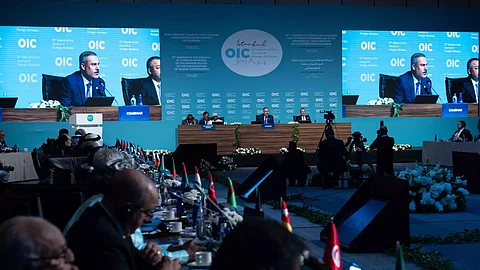

ISTANBUL (Türkiye): The Organisation of Islamic Cooperation (OIC), comprising 57 Muslim-majority nations, concluded its 51st Council of Foreign Ministers (CFM) in Istanbul with the adoption of the Istanbul Declaration on Sunday.
The bloc condemned the recent escalation of cross-border tensions between India and Pakistan and urged strict adherence to the May 10 ceasefire. It also called for the continued implementation of bilateral agreements, including the Indus Waters Treaty. The organisation also acknowledged the role of regional diplomacy in preventing further escalation.
"It is imperative that South Asia does not become a theatre for extended conflict," said one diplomat on the sidelines of the summit. "Our call is for dialogue, justice, and mutual respect across all borders."
Amid a shifting geopolitical landscape marked by the Israel-Iran conflict, the declaration strongly condemned Israeli military aggression and voiced unwavering support for Palestine and persecuted Muslim communities globally.
The summit, hosted by Türkiye under its new term presidency of the OIC, emphasised that Muslim nations must assert their collective voice to protect regional stability, uphold international law, and defend the rights of oppressed Muslim populations.
Opening the declaration, the OIC categorically condemned Israel’s aerial strikes on Iran, Syria, and Lebanon, describing them as "flagrant violations of the sovereignty of regional states and international law."
The Council announced the formation of an Open-Ended Ministerial Contact Group to pursue de-escalation and international accountability. The group is tasked with engaging global powers and regional stakeholders to seek a peaceful resolution and prevent further escalation that may destabilise the wider West Asian region.
The declaration warned that Israel’s actions were not only a threat to human security but could also lead to severe economic and environmental consequences.
Reaffirming its founding purpose, the OIC placed the Palestinian issue at the core of its mission. Ministers condemned Israel's ongoing military campaign in Gaza, now entering its 19th month, as a form of genocide, and denounced what they termed systematic attempts to eliminate the Palestinian people’s right to self-determination.
Key resolutions included:
Endorsing UN Security Council Resolution 2735 for an immediate ceasefire.
Supporting the Arab-Islamic recovery and reconstruction plan for Gaza.
Calling for full political and financial backing of the Palestinian Authority’s control over Gaza and East Jerusalem.
The OIC also rejected any plan that would result in the forced displacement of Palestinians and called for unrestricted humanitarian access to the besieged enclave. It renewed calls for a UN High-Level Conference on Palestine, co-chaired by Saudi Arabia and France, to reinvigorate the two-state solution.
The declaration expressed grave concern over Israeli attempts to alter the Islamic identity and demographic character of East Jerusalem (Al-Quds).
The OIC praised the Hashemite custodianship of Islamic and Christian holy sites and backed UNESCO’s resolution recognising the Al-Aqsa Mosque/Al-Haram Al-Sharif as a Muslim place of worship.
Islamophobia and hate speech
The OIC raised alarm over the global rise in Islamophobia, identifying it as a form of racism, religious discrimination, and political weaponisation. The Istanbul Declaration condemned hate speech, religiously motivated violence, and stereotyping of Muslim communities, particularly in Europe and South Asia.
It urged international governments to:
Introduce legal frameworks to criminalise Islamophobia.
Prevent acts of defamation against religions.
Promote intercultural and interfaith harmony through education and media.
The ministers also reiterated that terrorism has no religion, cautioning against narratives that associate Islam with extremism.
The OIC extended strong support to the Rohingya Muslims of Myanmar. It backed The Gambia’s genocide case at the International Court of Justice (ICJ) and demanded the safe, voluntary return of Rohingyas to their homeland with dignity and citizenship rights.
The bloc also noted the situation of:
Muslim Turkish Cypriots are facing isolation.
The Turkish Muslim minority in Western Thrace, Greece, demanding full cultural and religious rights.
Bosnian Muslims, where political pressures are undermining the Dayton Peace Agreement.
On Syria, the OIC praised initiatives by Türkiye and the Islamic Development Bank to support recovery in war-affected zones. It called for joint projects in energy, infrastructure, and essential services.
Regarding Azerbaijan, the declaration acknowledged recent progress in the peace process with Armenia and appealed for greater support to Azerbaijan's demining and rehabilitation efforts.
In a nod to structural reforms, the Istanbul Declaration asserted that the OIC must evolve into a stronger global player amid weakening multilateral institutions. Türkiye pledged to use its presidency to amplify the voice of Muslim minorities and enhance the organisation’s diplomatic reach.
The declaration commended Pakistan, Algeria, and Somalia for their advocacy of Islamic causes at the UN Security Council. It also welcomed the upcoming Islamic Summit Conference in Azerbaijan in 2026, expected to advance unity among Muslim nations.
Have you liked the news article?